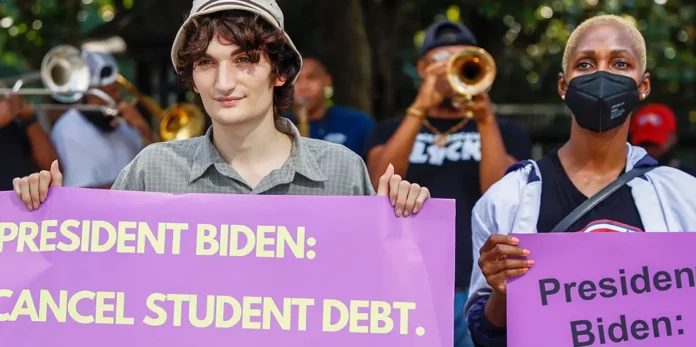Republican state attorneys general and conservative organizations are considering legal challenges to President Biden’s decision to cancel some student debt of between $10,000-$20,000 for some Americans.The Job Creators Network, a conservative group, is currently evaluating legal and political options to resist the handout. They say that the argument for Biden’s unilateral ability to cancel student debt for millions rests on unstable ground.
Finding someone with standing to sue is the first step in a legal challenge. Lawyers will need to show that cancelling student debt causes a substantial amount of harm to at least one party, and explain how a court will stop the handout.
It is difficult to find someone who has been affected by this decision at the moment.
Congress and the Supreme Court have already ruled that taxpayers don’t have standing to sue government. Borrowers who have already paid off their loans are unlikely to be eligible for the handout, as they aren’t directly hurt by the White House action.
Similar views are held by state governments, since the student loan handout doesn’t impose any burden on their finances and powers.
Experts say loan services may have the best case for a lawsuit because they directly impact the handout. The loan servicers might argue that Biden overreached when he issued a blanket handout instead of tailoring it to those who have proven economic hardship.
However, some federal courts have in the past refused to let government contractors sue for regulations that affect their profit margins.
Fox News Digital was told by Patrick Morrisey, West Virginia Attorney General, that the standing issue would be resolved and there is plenty of legal precedent to block the handout. Morrisey cited his recent victory in West Virginia v. EPA before the Supreme Court, a decision that severely curtailed the federal government’s ability to regulate greenhouse gas emissions.
The high court reached its 6-3 decision by citing a long-standing legal doctrine that states that Congressional authorization is required if federal agencies take major actions with significant economic and political implications.
Wednesday’s announcement by the White House revealed plans to forgive $10,000 student debt for borrowers earning less than $125,000 per year. Pell Grant recipients will be eligible for $20,000 in debt assistance if their income is below $125,000. Officials from the Administration claim that the decision will not benefit any household or individual in the top 5% earners.
According to the Committee for a Responsible Federal Budget, the handout could result in a loss of approximately $500 billion for the U.S. taxpayers over the next ten years.
Biden invoked 2003 HEROES Act to justify his decision. The law, which was passed in the wake the September 11th terrorist attack and during the height of War on Terrorism, allows the Secretary to Education to modify or waive student financial aid programs during times of war or national emergencies.
The law provides that this authority is applicable to military personnel on active duty, those who live in an area affected by a national emergency and anyone who has suffered “economic hardship” directly as a result of war, military operations, or national emergency.
Biden’s Justice Department uses the “economic hardship” clause to argue that student loan debt can be cancelled by the education secretary en masse due to the lingering effects from the coronavirus pandemic.
Assistant Attorney General Christopher Schroeder stated that the HEROES Act gives the Secretary of Education the authority to reduce or abolish the obligation to repay federal student loan principal debt.
Critics point out, however, the Biden administration had previously claimed in court that coronavirus pandemic is over when trying to rescind Title 42 — an emergency Trump-era order to expel illegal aliens from the border –




